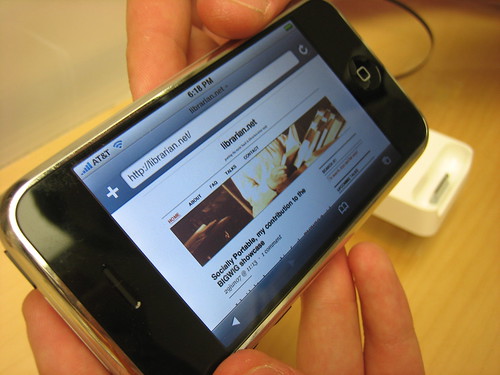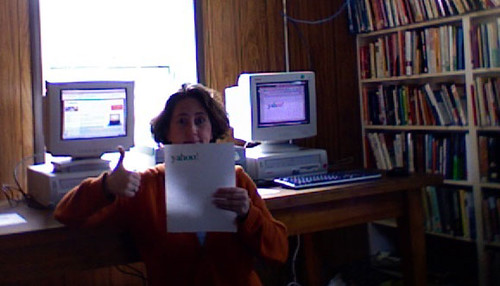Or, if you don’t know what I’m taking about, go read this story: Discord Over Dewey. It’s loosely about the Arizona library that decided to get rid of Dewey and make the shelves more bookstore-like, you know the one, but it gets bigger. To quote the article
[T]he debate, say many librarians, is about more than one branch’s organizational system. It feeds into a broader, increasingly urgent discussion about libraries, where a growing number of patrons, used to Google and Yahoo, simply don’t look for books and information the way they used to. Some are drawing on cues from the Internet in proposals for overhauls of cataloging systems, but others are more hesitant, saying that the Web’s tendency to provide thousands of somewhat-relevant results flies in the face of the carefully tailored research libraries pride themselves on.
And if the Wall Street Journal can end a sentence with a preposition, we know the times are changing, right? I’m quoted a little in the article. I had a nice long chat with the writer — as with the NYT piece — and just a tiny bit of it got quoted which I think confuses a few issues, but hey it links here so I can spell them out now in more detail.
- The difference between research and looking for information for other purposes. There are much stricter requirements for research — what’s citeable, what’s a good source, what’s authoritative — and a lot of the agitation has been about less-authoritative sites being used more and more not just for people looking up things that interest them, but also for research or attempted research. Is it okay to cite Wikipedia as long as you can prove that you understand that it’s not authoritative? Isn’t there research value to saying that some fact is in Wikipedia, even if it’s not necessarily the same value as that thing being true?
- The age gap. People not raised with Google are often more okay with their searches being iterative processes that take longer. Some aren’t. Similarly, younger users are often impatient with iterative searching or the very familiar “try these sources and let me know if they’re okay and if not we can find some others” approach.
- Google slicing. I was making a point that because Google is so popular, people forget that information can be indexed by different things than Google decides to index it under. So, searching for content by filesize, by “most recently added to the catalog”, by date added, these are all things Google could do but doesn’t. The problem is that we are forgetting that there are other ways to determine relevance, or relevance to US.
In any case, I liked the article and it had good quotes from a lot of people, some you will recognize and a few you may not. They end the bit with a good line from Michael Casey “Librarians like to think that we’re indispensable,” he said. “While I think that is true to a point, I don’t think we should continue to propagate the idea that we’re indispensable by keeping a complicated cataloging system.”

